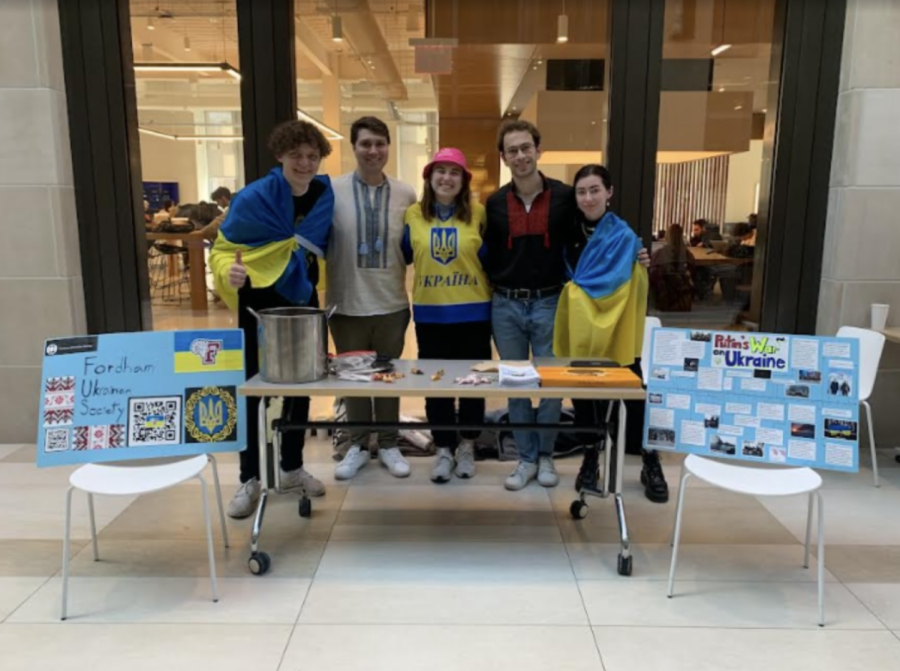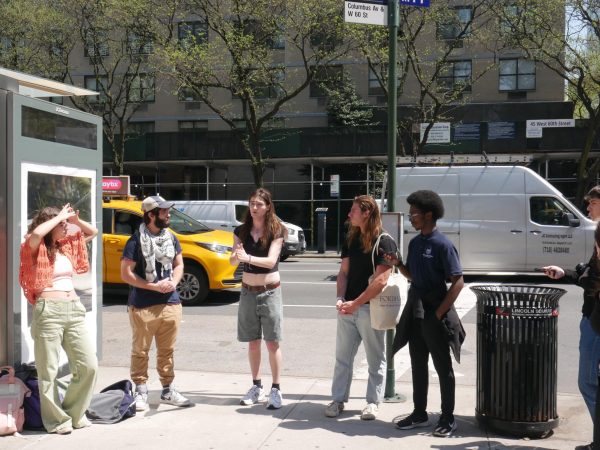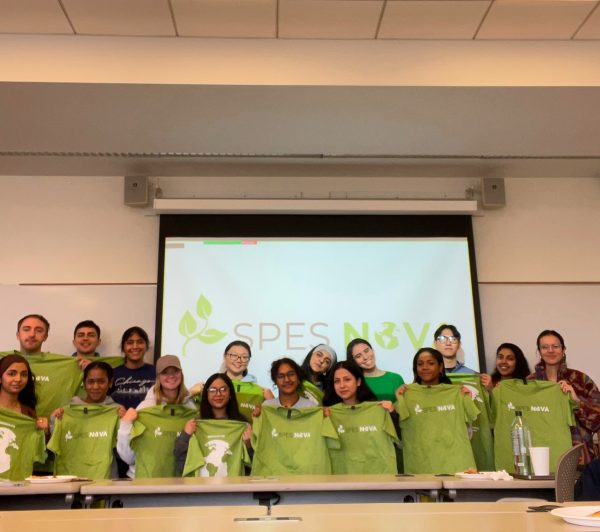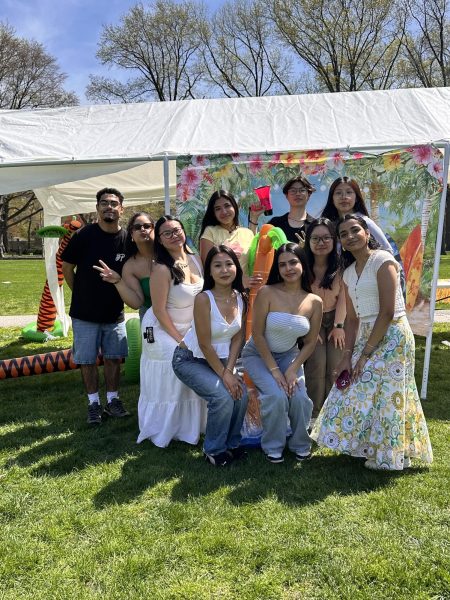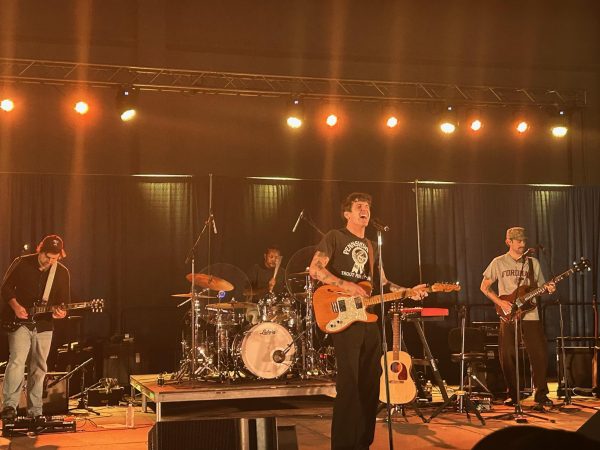Fordham Ukrainian Students Raise Awareness Over One Year of War
The one-year anniversary of the Feb. 24 invasion of Ukraine and start of Russia’s subsequent war was spotlit by a tabling event hosted by the Fordham Ukrainian Society (FUS) and sponsored by the Office of Multicultural Affairs (OMA). With their showcase held in the McShane Campus Center, FUS sought to teach the Fordham community not only about the ongoing war raging in their homeland, but also to promote Ukrainian culture and traditions.
The War in Ukraine began in 2022 when boiling Russian military aggressions spilled across the two nations’ shared border in a “special military operation” mirroring the 2014 Crimea peninsula invasion. This attack erupted in a full-scale assault incarnating the centuries-long Russian policy and goal of attempting to gain control of the historically independent Ukraine.
“Today, Friday the 24th, marks the one-year anniversary of the war in Ukraine,” said FUS President Yustina Hryciw, FCRH ’23, “and it’s so significant for us to remind people it is still going on, but that the people of our Ukraine also fight on.”
FUS and their event shared their customs with the Rams, voicing their patriotic pride for their homeland, as well as against the Russian government and their war.
In their aim of educating students and raising awareness about the Ukrainian conflict, FUS created and displayed a timeline illustrating major events and developments in the war, including notable Russian missile strikes, Ukrainian advances and visits to Ukraine and the U.S. between members of each other’s governments.
A zine pamphlet was also created and distributed as a portable format for students to continue learning and sharing facts about the conflict. FUS’ treasurer cooked a pot of homemade Ukrainian borscht, a customary beetroot soup and handed out samples to visiting Rams, along with various traditional Ukrainian chocolate and gummy candies.
“Everyone can read our timeline to learn the truth about Ukrainian customs and Russia’s war, and try our soup and snacks to be exposed to our heritage,” said Hryciw. “We also want to attract Ukrainian students and anyone who is interested to know more about our cause and culture.”
“Having grown up all over Europe, with much of my family in Ukraine, dealing with finding my identity was very hard while not living in the country where I feel like I’m from,” said Alexander Yankovsky, FCRH ’24, treasurer and “Head Babushka” who was born in New York and raised in Hungary.
“We want the FUS to be a place where Ukrainians can come together and have something to share that they can be a part of.”
“The Russian government has claimed it’s part of their heritage in their efforts to steal our culture, and so Ukrainian borscht has become a symbol of our persevering drive and sovereign originality,” said Yankovsky.
Borscht, a brothy vegetable soup, is made with fried and boiled carrots, celery, potatoes, cabbage and beetroot. “It tastes wonderful, and cures all your ills,” said Yankovsky. Borscht is a biweekly treat at Yankovsky’s home, and especially during Christmas Eve for Hryciw.
“The soup’s great, great, amazing,” says Anton Bilozor, GSB ’26, who visited the FUS event. He moved from Kyiv seven years ago, and his grandparents are still in the city — but they’re safe. “It’s cool this club is promoting the Ukrainian nation and origins.”
Secretary Amy Herd, FCRH ’25, worked on the zine for the tabling event. “With all the exaggerations and propaganda about the war, we wanted to distribute ‘real news’ in response,” says Herd. “We felt we had to do so, for the justice of Ukraine. It’s something people can take to continue to learn about aid resources to donate to, local cultural sites in N.Y. and facts about the Ukrainian diaspora.”
The Ukrainian Society is not an officially registered Fordham organization. “A Ukrainian club has existed at Fordham before, and though it dissolved due to a lack of membership, there’s always been a lot of Ukrainian students who attend Fordham,” Hryciw said. “I’ve still always felt there was a need to celebrate Ukrainian culture since my freshman year, even before Russia’s invasion.”
When Hryciw was in Bilbao, Spain, studying abroad during the spring 2022 semester, the war broke out, and she realized the time was very ripe to start a club to raise awareness. Her quest to resurrect the FUS began by a coincidence in Wildwood, N.J., where she met George Mychajluk, GSB ’23, at a beachside Ukrainian Independence Day event in August 2022.
“Once we realized this,” Hryciw said, “I grabbed George, looked him in the eyes and grinned, ‘We’re starting a UKR club again,’ and he laughed back ‘OK!’ And I wasn’t sure if anyone else was going to start the club, so I realized I had to do it and started contacting everyone I knew.”
“The whole idea behind the club wasn’t about the war,” said Mychajluk, vice president. “It was always about increasing visibility of the Ukrainian community in the city, and to show our culture to Fordham students and teach them all they want to know. But if we can provide reliable resources about the war, that’s super important because we want to do our part here at Fordham, for our people.”
Social Media Coordinator Nicholas Levytsky, FCRH ’23, who created the zine with Herd, said he also thinks having a Ukrainian club on campus is important.
“Ukraine is something I wake up with every day, and I’m thinking about my family there — and that doesn’t ever go away; it’s something I can’t turn off,” said Levytsky. “I’m trying to get that feeling and reality out to people. Voicing it to people who don’t see that as easily is really important. I’m proud to identify with my Ukrainian culture. But now it feels even more dire to express that, because now it’s under threat.”
Sofika Levytsky, FCRH ’24, a member of the club, worked on the timeline with Hryciw and Herd. “I really like the club very much; it’s important for all of us,” Levytsky said. “As a freshman, it’s nicely different to share cultural similarities with fellow Ukrainians. I’ve looked for something like this since fall 2022. It’s cool to have a place where I can celebrate Ukrainian customs because someday I want to do pysanky egg decorating.”
“We need to become an official club because we want to organize authentic Ukrainian cultural events and promote a better understanding of our traditions to the student body,” said Hryciw. “FUS creates an environment for the community to get together, take advantage of great fundraising opportunities and create a Ukrainian space on campus. We dream of even connecting the Ukrainian students of NYC as well.”
Hryciw wore a pink bucket hat, a trademark symbol of the Ukrainian Kalush Orchestra, which won the Eurovision music competition in 2022. When Kalush won Eurovision, Ukrainians began wearing pink bucket hats in unity, just like Yustina’s, which is signed by several members of the orchestra.
Joshua Fiorentino, FCRH ’25, spotted Yustina’s hat from the second floor balcony above the event. “I watched Eurovision, and as a fan, it’s very nice to see everything connect together.” The Kalush Orchestra’s winning music video features mothers sacrificing everything to save their kids, an enduring theme of present strife and striving for growth by the next generation.
“We want Ukraine to win completely,” said Hryciw on the war in Ukraine. “And take back all Ukrainian territory.”
“No matter what, I’ve always been proud to be Ukrainian,” said Coordinator Levytsky. “Always going to be proud, too.”
FUS has an Instagram page, @fordham_ukrainians, with different resources and updates about the club.



































































































































































































